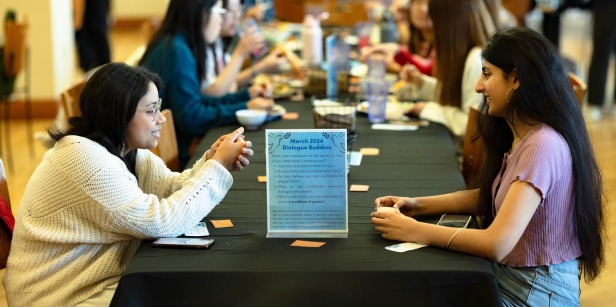
History
Founding Principles
Soka University of America (SUA) was founded by Daisaku Ikeda, a Buddhist philosopher, peacebuilder, educator, author, and poet, who established the global Soka (value creation) school system based on the educational pedagogy founded by Tsunesaburo Makiguchi and his disciple Josei Toda.
The heritage of SUA is rooted in a love for humanity and respect for each individual. It is embodied in a courageous spirit to serve as a beacon of hope dedicated to harnessing the privilege of higher education to uplift those not afforded the same opportunity.
In his essay “Stop the Killing” Ikeda shares, “[Education] must foster people who intuitively understand and know—in their minds, in their hearts, with their entire being—the irreplaceable value of human beings and the natural world.”
Such became the basis of Soka: to foster global citizens committed to developing the courage, wisdom, and compassion required to build a society in which the basic value of human dignity lies at the center of decision-making in all sectors of human endeavor.
Soka University of America’s Commitment to Its Founding Principles
Our university was founded with a focus on these elements of global citizenship—a focus that served as a “propelling force” (Ikeda, 1996).
In 2020, as global society faced a racial reckoning, SUA, too, faced its own reckoning, leading to institutional changes grounded in a return to its founding principles. Across the nation, higher education institutions saw a rise in activism to expose inequitable practices and to heighten the consciousness of campus communities. At SUA, individual students and student organizations (especially the BIWOC: Black, Indigenous, Women of Color, SOCC: Students of Color Coalition, BIPOC: Black, Indigenous, People of Color Students Collective, and supporting affinity groups) were instrumental in helping to raise SUA’s campus consciousness surrounding issues of race and efforts to advance inclusion.
This time became an opportunity to reflect and make institutional changes. Recognizing the need for a dedicated team to steer our community toward organizing and implementing inclusion efforts, President Edward Feasel established the Office of Diversity, Equity, and Inclusion (DEI). In doing so he acknowledged the input and contributions of SUA’s affinity groups as drivers in identifying and acknowledging the gaps in our practices.
Based on the areas that students called into focus, the following initial areas were held as priorities:
- Creation of initiatives to develop new courses related to issues of race, ethnicity, and human rights spearheaded by the Center for Race, Ethnicity, and Human Rights
- Creating a comprehensive Bias Reporting System
- Holding community forums and trainings around various topics, including but not limited to implicit bias training
- Improving our mental health services to include options where students could be matched with counselors of a similar or shared identity
- Creating a support system for student affinity groups in the Office of Student Activities
- Planning, sustaining, and measuring our work through strategic planning processes and the use of climate survey data
The work of the Office of DEI and other areas on campus has grown to include numerous programs, workshops, and resources aimed at ensuring our campus community members feel a genuine sense of belonging, and that we are prioritizing initiatives that incorporate feedback from the entire community.
Our work is ever-changing and ongoing, and we understand that inclusion work takes constant reevaluation of practices and requires conscious awareness of the needs of our community. At the heart of this endeavor is building a team that is largely student-driven. We are honored to have a growing DEI team, including student employees and the DEI Student Advisory Board, that is tapped into the campus climate and provides valuable direction to our initiatives. The heart of our office can be summarized by our mission statement that states we are tasked with “supporting and cultivating individuals who embody the characteristics of a global citizen and ensuring that the SUA community continues its ever-evolving development, grounded in dignity and respect for each individual.”
We invite you to visit the rest of our website to learn more about how we work toward actualizing our mission through intentional everyday efforts.
